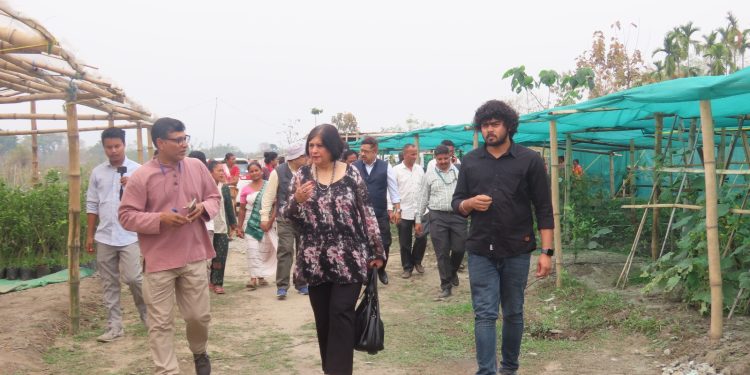“High-yielding native crop varieties suitable for this region should be preserved and cultivated for the well-being of society. Alongside, disease-free mother plants are crucial for getting quality saplings and better production,” said Dr Vibha Dhawan, Director General of The Energy and Resources Institute (TERI) during a programme at Udalguri in Assam.
Dr Dhawan also emphasised the importance of improving soil health and promoting drought-resilient crop varieties during the stakeholder consultations organised by Aaranyak.
Under the GEF-UNDP Small Grants Programme (Operational Phase 7), premier biodiversity conservation organisation Aaranyak (www.aaranyak.org) is implementing the project community-based integrated approach to facilitate human-elephant coexistence (HEC) and biodiversity conservation in Udalguri, Assam.
As part of this initiative, Aaranyak organized a local stakeholder consultation at the Jaikhlong Community Nursery at Dimakuchi, Udalguri.
Dr Dhawan also emphasised the need for community participation and a sustainability plan to ensure the long-term impact of the project while Dr. Dipankar Saharia, Senior Director of TERI highlighted local challenges and the role of collaborative efforts for biodiversity conservation. Dr Saharia also focused on the role of agrobiodiversity to fight against climate change.
Dr Dhawan also visited the nursery, interacted with community members, and inaugurated a children’s library for the children of nursery workers. She said “This library will serve as a valuable resource for the children, nurturing their curiosity and providing them with knowledge beyond the classroom.”
Dr Dhawan praised the efforts of the community in developing mother-plant blocks of sweet lemon, Assam lemon, Tezpur litchi, and black pepper, and advised on the importance of keeping the mother-plant blocks disease-free for future sapling multiplication and preparation.
Dr Partha Jyoti Das, Head, WATCH Division of Aaranyak delivered the welcome address where community members, project beneficiaries, village heads, SHG members, members of the JFMC, the Agriculture Development Officer, and the Agriculture Extension Officer were also presents.
Jayanta Kumar Pathak, the team lead of the UNDP-GEF SGP project at Aaranyak expressed that Aaranyak is keen to continue the existing work and also to scale it up.
Aaranyak will start training sessions at the nursery shortly. The core team of the SGP project Dipankar Haloi, Rabiya Daimari, Haben Mochahari and other dedicated team – Abhijit Saikia, Mondeep Basumatary, Abhilasha Baruah, Bikas Tossa, Didom Daimari, Bineswar Basumatary and Pradeep Barman put efforts and ensured the smooth conduction of the event.
The National Coordinator of SGP-OP7 project Manish Pandy also argued about the necessity of the collaboration of different stakeholders to achieve the set goal of GEF.
The Dimakuchi Agricultural Development Officer and Agricultural Extension Assistant from Bholatar VCDC were also present in the consultation. The ADO informed farmers about current government schemes and minimum support prices (MSPs), enhancing their understanding of available agricultural support mechanisms.
The meeting, attended by over 70 participants, was highly interactive, with project beneficiaries engaging in discussions with dignitaries. Dr Dhawan praised the holistic efforts undertaken by the community and Aaranyak in promoting sustainable agriculture and biodiversity conservation.
It is worth mentioning that Aaranyak recently received the SGP Best Innovation Award from UNDP & TERI for its successful and innovative implementation of this project. This recognition further validates the organization’s commitment to conservation, community development, and human-elephant coexistence.
The visit by the TERI Director General marked a significant step in fostering collaboration between communities, research institutions and policymakers for sustainable rural development and ecological conservation in the region.





